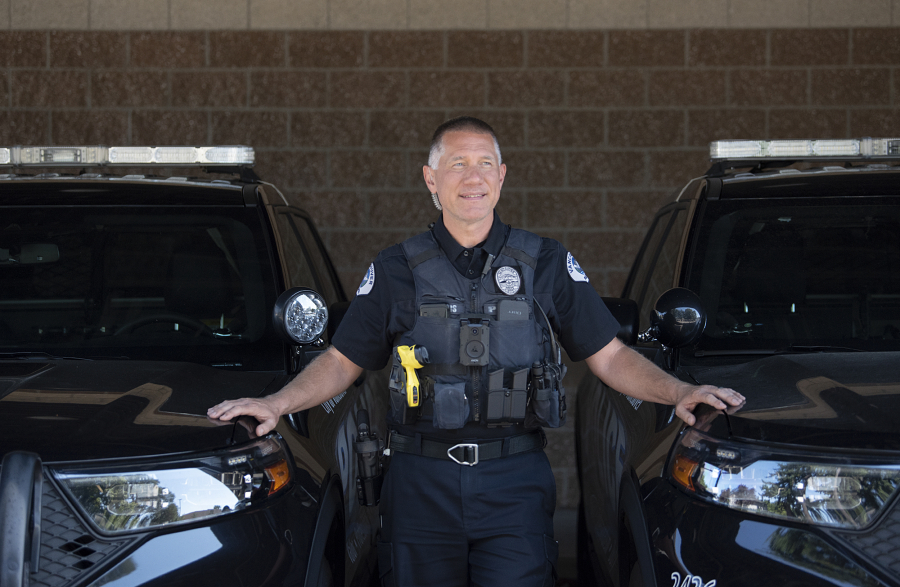Officer Tyler Chavers didn’t grow up dreaming of one day donning a navy blue uniform and badge. And if you told him he’d one day be in law enforcement working with homelessness?
“I’d say you’re crazy,” Chavers said.
Yet two decades into his career for the Vancouver Police Department, Chavers is an everyday face within the houseless community due to his work with the city’s Homeless Assistance and Resource Team, which serves as a community response to addressing the impacts of unsheltered homelessness. But what led the neighborhood cop to this work?
While in college, Chavers considered pursuing family counseling.
“I took a lot of psychology classes in college and was very interested in that,” he said. “But I just burnt out on school; I didn’t really have a goal or direction. I was a bit lost.”
He was at a crossroads. Should he finish with a four-year degree, pursue a master’s, or enter the workforce? He chose the latter, working as a postal carrier for a while before finding himself in a position at an insurance agency.
He was on the hunt for another trade. So when his wife saw an advertisement on television that the Anchorage police department was starving for officers, he applied.
“I walked into the station, filled out a form and they said, ‘See us next Tuesday,’ ” Chavers said. “On Tuesday, I was hired. I like to say this job really found me. I wasn’t one of those people who grew up knowing they’d be a firefighter, jet pilot, police officer. And that is probably good for me, because it always feels fresh, new and exciting.”
Chavers went back to school to study criminology with a minor in psychology and economics.
In 2004, he joined the Vancouver Police Department, eventually transitioning to a neighborhood police officer, overseeing almost everything west of Interstate 5.
At the time, unsheltered homelessness was rare.
But one day in 2015, a tent popped up outside the Share House in downtown. Then there were two. Before he knew it, there were more than 60 tents dotting the streets with no signs the trend was slowing down.
City officials were left scratching their head, asking questions.
“They started to say, ‘This is not a matter of police not doing their jobs …’ it was the question of, ‘Why are these people homeless, and what is going on?’ ”
After six months as a neighborhood officer, Chavers’ role evolved to keep up with the growing trend of unsheltered houselessness. He began spending an inordinate amount of time responding to calls regarding homelessness.
“Then the police department decided that the neighborhood police officers would be the homeless liaison officers for their district,” Chavers said.
As a liaison, Chavers, alongside other neighborhood police officers, would keep abreast of trends with people living outside and what the law says about homelessness, unlawful camping or property storage.
“I was kind of baptized by fire in that sense, this work was just thrust upon me,” he said.
“The underlying issue as an officer I was having (to) figure out was what services are available to our community and how do I provide that as a police officer? Because just moving them around or arresting someone is not actually solving the situation. It’s just re-creating the situation in a different place.”
Five years after Chavers became a neighborhood officer, word got out that the department was looking for someone to join the upcoming Homeless Assistance and Resource Team. And because most of his work had centered around homelessness at that point, he applied.
“I really liked the idea of being on the front end of something that was innovative with regards to homeless services,” he said. With a preexisting reputation on the streets with his outreach work, Chavers was selected.
The HART team blends outreach services, support and law enforcement to serve people living outdoors. The team is made up of three outreach workers and Chavers.
“My job is to do all the stuff that a civilian wouldn’t have the authority to do, nor necessarily the understanding or professional training experience when push comes to shove like should we tow that car or not,” he said. “Legally we can, but the question is, should we?”
Jamie Spinelli, homeless response coordinator for the city and HART member, said that having Chavers on the team has shifted some of the engagement between law enforcement and people experiencing homelessness.
“I think there’s been a significant amount of trust built with having Tyler taking the lead on how law enforcement manages homelessness,” said Spinelli.
Chavers builds that trust by following the golden rule: treat others how you’d want to be treated.
“I build relationships by being kind and respecting other people,” he said. “But kindness shouldn’t be mistaken for weakness … I think a large part of relationship building for me is following through. If I tell someone what the expectation is, I have to follow through or I will lose credibility. If I lose that, there’s no respect. And no respect means that I don’t have a relationship with them.”
When out in the field, he takes a bit of extra time to get to know people’s names, their stories on top of their needs.
“It is as easy as asking, ‘How are you doing today?’ and I really mean it. I’m not just starting a conversation,” he said. “I remind myself how I would want to be treated if I was in their shoes.”
There were stressful and bad days on the beat — what job doesn’t, he said. But there are many moments that make it all worth it.
For years, Chavers worked with a senior woman who had severe mental health issues. Everyone thought she was an “impossible” case and would never accept help. But then she did.
“To be a part of that gaggle team of folks coming together for her — that is a privilege,” he said.
A common practice in law enforcement is to rotate officers throughout roles to freshen up dynamics. But Chavers plans to stay with the HART team until his retirement.
“If you would have told me 25 years ago … even 10 years ago that I was going to finish out my career working with unsheltered homeless folks as my full-time job, I’d say you’re crazy,” he said. “But seeing people that I saw six years ago, with a drug addiction, angry all the time, involved in criminal activity, and then see them today; clean, sober, working, excited to be in the community and healing from trauma in therapy, overcoming all that — it’s surreal.”




